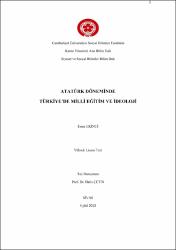| dc.contributor.advisor | Çetin, Halis | |
| dc.contributor.author | Ekinci, Emre | |
| dc.date.accessioned | 2020-02-27T06:15:02Z | |
| dc.date.available | 2020-02-27T06:15:02Z | |
| dc.date.issued | 2013 | tr |
| dc.date.submitted | 2013-09-20 | |
| dc.identifier.other | ii, 149 | |
| dc.identifier.uri | https://hdl.handle.net/20.500.12418/12246 | |
| dc.description.abstract | EKİNCİ, Emre, Atatürk Döneminde Türkiye‟de Milli Eğitim ve İdeoloji,
Yüksek Lisans Tezi, Sivas, 2013.
Bu çalışma Mustafa Kemal Atatürk döneminde Türkiye‟de milli eğitim ideolojisinde
yaşanan toplumsal, kültürel, sosyolojik ve siyasal dönüşümlerin neler olduğunu;
dönemin resmi ideolojisi doğrultusunda eğitimin niçin, nasıl ve ne amaçla kullanıldığını
göstermeye çalışmaktadır.
Çalışma kapsamında eğitim, resmi ideolojinin yeniden üretimi ve onun genç
nesillere aktarılmasından sorumlu bir üstyapı kurumu olarak ele alınmıştır. Diğer bir
deyişle eğitim, özneleştirme sürecinde, devletin güçlü bir ideolojik aygıtı olarak tanımlanmıştır.
Bu doğrultuda eğitim, ideolojinin bir aracı olarak açıklanmakta ve bu
yönüyle eleştirilmektedir. Çünkü devlet ideolojisi eğitim alanları içerisinde bireyleri
kontrol etmekte, gözlemlemekte, baskı altına almakta, disiplinize etmekte ve siyasal
iktidara uyumlulaştırarak resmi ideolojinin yeniden üretimi amacını taşımaktadır.
ideoloji kavramı çalışma kapsamında modern meşruiyet kaynağı olarak, toplumsal
yaşamın bütün alanlarına işlemiş olan fikirler bütünü olarak düşünülmüş ve
ele alınmıştır. Bu düşünceler aynı zamanda yönetici ve seçkinlerin egemen söylemini
dile getiren, onu meşrulaştırarak devamlılığını sağlayan ve kendi söylemsel alanı
doğrultusunda bireyleri özneler olarak kuran bir bütünlük teşkil etmektedir. Diğer
taraftan Kemalizm ise, Atatürk döneminde okutulan tarih ders kitapları ve Türk Tarih
Tezi analizleriyle somutlaştırılmaya çalışılmış ideolojik söylem olarak ele alınmıştır. | tr |
| dc.description.abstract | EKĠNCĠ Emre, National Education an Ideology in Turkey During The Ata-türk Period, Master Thesis, 2013 Sivas.
The purpose of this study is to Show, the social, cultural, sociological, and political transformations during the Mustafa Kemal Atatürk period in Turkey and How, Why and for What purpose education is used in accordance with the official ideology of the period.
In this study education is defined in terms of the reproduction of the official ideology and a responsible superstructure for its transfer to the younger generations. In other words, education is defined as an ideological device of the state during the subjectification process. In this coontext education is explained and criticized as a means of ideology in this respect. Because, the ideology of the state controls, obser-ves, puts pressure on, is disciplined the individuals in the fields of the education and, it is intended to reproduce the official ideology by adjusting to the political power.
The concept of ideology has been discussed and tought as a source of modern legitimacy and a set of ideas that have commited in all areas of social life in the sco-pe of work. These ideas, compose a whole at the same time explains the dominant discourse of administratives ans elites and by legitimizing allowing the continuation of it and constructing individuals by their discourse space. On the other hand, Kema-lism is discussed in detail by an ideological discourse which was tried to be actuali-zed by the history textbooks during the Atatürk period and the analysis of the Tur-kish History Thesis. | tr |
| dc.language.iso | tur | tr |
| dc.publisher | Sivas Cumhuriyet Üniversitesi-Sosyal Bilimler Enstitüsü | tr |
| dc.rights | info:eu-repo/semantics/openAccess | tr |
| dc.subject | Eğitim | tr |
| dc.subject | İdeoloji | tr |
| dc.subject | Resmi İdeoloji | tr |
| dc.subject | Meşruiyet | tr |
| dc.subject | Üst Yapı | tr |
| dc.subject | Kemalizm | tr |
| dc.subject | Modernizm | tr |
| dc.title | Atatürk Döneminde Türkiye'de Milli Eğitim ve İdeoloji | tr |
| dc.type | masterThesis | tr |
| dc.contributor.department | Sosyal Bilimler Enstitüsü | tr |
| dc.relation.publicationcategory | Tez | tr |















